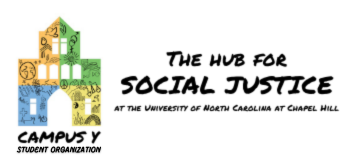Campus Y alum finds purpose and passion on pupusa food truck
February 9, 2018 • Erin Reitz • No CommentsCould you give a brief overview of your path to UNC?
My parents and three sisters fled the civil war in El Salvador and migrated to Los Angeles about ten years before I was born. Right before my first birthday, they decided to move across the country from Los Angeles to Durham, North Carolina.
I really looked up to my older sister, who was the first in our family to go to college. She was my role model and when she came to Carolina, I knew that’s where I wanted to go too. This has always been my dream school, but as I was applying I was really fearful about not getting in and not being able to pay for college. Applying for scholarships became my full-time job outside of school my senior year.
I remember learning about the Morehead-Cain scholarship and thinking, “That would be amazing,” but I also heard that my school, Northern High School, hadn’t had a Morehead-Cain recipient in something like 20 years. My family and I were so excited when I got it. I immediately pulled all of my other applications and committed to Carolina. It was a dream come true.
How did you get involved at the Campus Y? What did this space mean to you as a student?
When I got to Carolina, the Campus Y was one of the first spaces that I felt safe. It was a place I knew I could come and see familiar faces. Even today, it still feels like a home. I love that everyone is willing to hear you, see you, and support you.
My first experience with the Campus Y was as a Global Gap Year Fellow. The Fellowship meant not going to college right away, but I knew it was too good of an opportunity to pass up. It changed my life.
Then the CUBE [the Campus Y’s social innovation incubator] really changed my trajectory as I was a junior going into my senior year. I had all of these ideas and the CUBE gave me a vocabulary to talk about social justice and social impact. I was able to ask, “How can I create a career doing something I love?” The CUBE not only helped me with the the business side of starting a food truck but also how my social mission fit into the plan.
Why did you want to start a social venture?
I knew I wanted to give back. I’ve benefitted so much from scholarships – not just the Morehead-Cain, but also need-based scholarships like the Global Gap Year Fellowship – but as a student, I didn’t have any money to offer. At the time I was learning about cultural capital and this concept allowed me to see the value in all of the things I’ve been given to succeed. Being bilingual, having a family network, expressing our culture through traditional food – these are treasures. I did not have much monetary capital, but I realized I had these rich resources that I could use to create something special.
Talk about who your scholarships benefit.
Recent statistics show that about 65,000 undocumented students are graduating every year from public schools in North Carolina. That is a whole population of students who could be going to community college or a 4-year university, but since they have to pay out-of-state tuition, they can’t go or they go to another state where they can get a better deal. These students have gone through the public school system and have no problem getting into college, it’s just the financial barrier that stands in their way. That is an injustice to me. There are thousands and thousands of students who are doing incredible work and there’s no continuation of support in North Carolina after high school. I think it’s one of the biggest issues we have.
Besides working to support a cause you believe in, what’s your favorite part about working on the truck?
I’m usually on the truck with my mom and that is really special to me. I don’t think I would be learning her recipes or our culture as adamantly if it wasn’t my job to do so. She says I’m her boss, but really, she’s my boss.
My mom loves feeding people and loves sharing her food. Initially she wasn’t on board with the food truck idea, but once she saw that it allowed us to teach people about pupusas and El Salvador, she got really excited. We are announcing and affirming our existence.
There’s a sort of high that you get – like a runner’s high – when you’re in the flow on the truck. When we finish a busy day and have served hundreds of pupusas to people, it’s incredible. My mom still can’t believe it, but I tell her, “Yeah, there’s a place for us and our food here.” We’re not just surviving, we’re thriving.
What do you hope other students learn from your story?
One thing I love about the Campus Y is that they didn’t kick me out when I graduated. I’m still very connected to the CUBE and the students there. I love working with them because they’re so passionate and hardworking and I hope it motivates them to see a woman of color running a business. I remember my aunts would ask me, “Global Studies? What job will that major get you?” But I’m here now and I want others to know that education doesn’t have to be a rigid path. At Carolina I made my education about me, what I wanted to learn and how I wanted to use it. I hope more students feel inspired to do something that they love. I am proof that you don’t have to have a lot to do something meaningful.
This interview has been edited and condensed.

